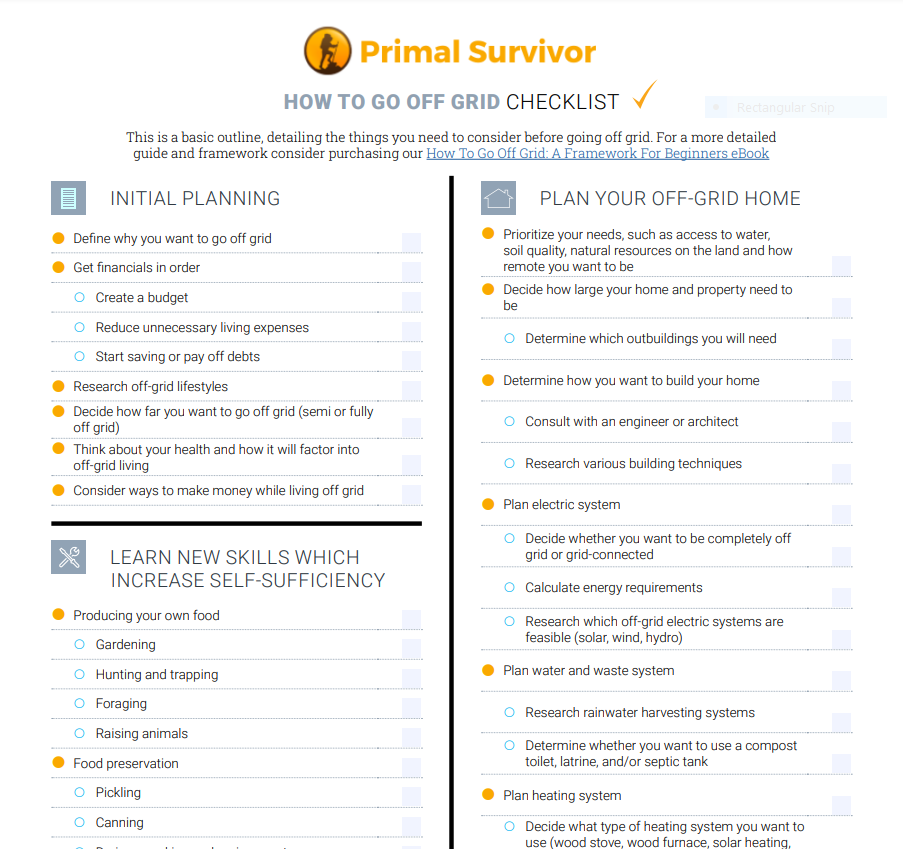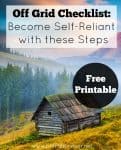All through social media and blogs, we see inspirational people who have completely cut ties with the grid…
- The entire Dutch town which will live off grid, grow its own food, and handle its own waste.
- The entire island in Vancouver where 350 people live in an off-grid community.
In short, it is very possible to live off grid!
How to Get Started Living Off Grid?
The hardest part is always getting started. It can seem pretty daunting with something as “drastic” as going off grid.
Do you start by learning carpentry? Or how about how to grow and preserve your own food?
Off-grid living will differ for everyone, but the checklist below should help you.
If you already live off-grid, please let us know how you made it happen!
How to Go Off-Grid Checklist
Click to download PDF version.

1. Initial Planning
- Get financials in order
- Create a budget
- Reduce unnecessary expenses (new clothes, cable TV, eating out, etc.)
- Start saving
- Pay off debts
- Research off-grid lifestyles
- Research local laws about off-grid living
- Decide how far you want to go off-grid (electricity, water, sewage, etc.)
- Decide how remote you want to live
- Think about your health and how it will factor into off-grid living
- Define WHY you want to go off-grid
- Think about your skills (carpentry, gardening, first aid, etc.)
- Consider ways to make money while living off grid
2. Start Producing Your Own Food
- Learn about gardening
- Start a garden at your current home – choose just a few plants for starters
- Learn about other gardening methods, such as: permaculture, greenhouses, hydroponics, and aquaponics
- Learn how to hunt
- Get a hunting license
- Get a gun
- Set up practice area or go to range
- Learn about animal behavior and tracking
- Learn how to butcher animals
- Learn about raising animals for food
- Take a tour of a small farm
- Volunteer/apprentice on a farm
3. Learn to Preserve Food
- Learn how to pickle produce (lacto-fermentation and vinegar method)
- Learn how to can produce
- Learn how to dry and smoke meat
- Learn how to make a root cellar
- See our in-depth guide to food preservation here
4. Buy Your Property
- Choose an area to live
- Prioritize your needs, such as accessibility, access to water, whether there are neighbors, soil quality, and natural resources on the land
5. Plan Your Off-Grid Home
- Consult with an engineer or architect who specializes in green homes
- Learn about green homebuilding methods and materials
- Decide how large your home needs to be
- Consider how to expand home later, if necessary
- Decide whether you want to build the home yourself
- Plan the layout of the property
- Consider sunlight exposure, access to water, well locations, waste disposal areas, gardens, sheds and outbuildings
- Plan your plumbing and water supply system
- Research rainwater harvesting systems
- Determine whether you want to use a compost toilet, latrine, and/or septic tank
- Hire a geologist to locate well locations on your property
- Plan your electric system
- Decide whether you want to be completely off grid or still connected
- Decide if you want to use solar power, wind power, or both
- Research whether you can gain any rebates for going off-grid
- Consult with a solar power engineer
- Calculate your energy requirements
- Calculate equipment needs
- Plan your heating system
- Decide what type of insulation you will use
- Decide what type of off grid heating system you want to use (wood stove, wood furnace, solar heating, power generators, coal, animal dung as fuel)
- Secure access to heating fuel
- Build a root cellar
- Plan transportation methods
- Learn auto mechanics
- Consider bikes, motorbikes, quad bikes, 4WD vehicles, or other forms of transportation suited for the area
- Reassess your budget
- Plan for building expenses, permits, tools, labor, machinery, repairs, and other startup costs
- Prioritize costs
- Make a project plan for your off-grid home
- Include an itemized list of expenses per project
- Determine what projects you will do first
6. Moving Into Your Off-Grid Home
- Construct your home
- Decide at what point you will move in
- Consider living there on weekends in an RV or tent if you can’t completely move in right away
- Water and plumbing
- Install toilet system
- Drill well
- Set up rainwater harvesting system
- Set up greywater harvesting system
- Set up an off-grid shower
- Heating
- Install heating system
- Start stockpiling fuel for the winter
- Electric
- Install solar system
- Get generator
- Practice reducing energy use
- Waste
- Start a compost pile
- Learn to reuse and reduce waste
- Start your garden
- Calculate how much food you need to plant to survive the winter
- Decide what types of foods you want to grow
- Design your garden
- Budget for and buy any tools you need
- Plan crops by season
- Plant an orchard for fruits and nuts
- Start sprouting seeds for your first crop
- Learn to maintain and repair tools
- Get chickens
- Build a chicken coop
- Buy heat lamps for chicks
- Buy chicks and raise them indoors
- Move chicks to their coop when the weather is warm
- Get livestock
- Build pens, fences, and pastures
- Build a barn if necessary
- Go to livestock fairs to start learning about breeds
- Consider how you will transport livestock
- Buy your livestock
- Learn veterinary care
- Build greenhouse
- Build aquaponics system
- Stay healthy
- Learn first aid
- Learn natural remedies
- Set up a medicinal garden
- Stay active and eat healthy to prevent disease
- Be happy because you are living off the grid now!
For printable versions of this checklist and 16 others, see our checklist bundle.



Love it all I’m 69 years old and ready to go to the Ozarks to look for property I’m in n.c. have cabin to sell. Going to look at 10 to 20 acres. Ready to go just me and Gunter.
Is that your dog “Gunter”
Love the list. We are almost there have about 85% of what is listed here. I will be glad when we pull the final plug. Any info to share on land patents in place of deeds? Also filing sovereignty papers ?
GREAT PAGE
Having moved from Melbourne 23 years back, with everything reticulated, we bought 20 acres in ” the middle of nowhere” 4 hours NW and built our own house 14sq. – and did practically everything ourselves. It works very well – except that now we are starting to get less than desirable neighbours. The land wasn’t isolated enough. It’s been a fabulous adventure though – and not finished yet! Almost completed detailed account of events …with pics. Cheers
Sounds fascinating John, let us know if you put your account online.
If your of grid why do you need permits ? I’m just so tired of people. Is it really that hard ?
You’d be amazed at how hard it can be. Without electricity, for example, you might not get a “certificate of occupancy” to legally live in your home. If you want off-grid electricity, you’ll need a permit for solar, hydro, wind… More on those laws here: https://www.primalsurvivor.net/living-off-grid-legal/